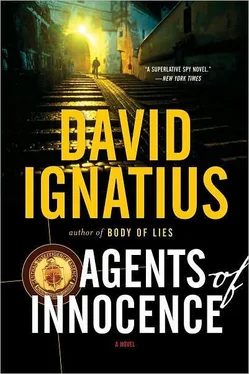David Ignatius - Agents of Innocence
Здесь есть возможность читать онлайн «David Ignatius - Agents of Innocence» весь текст электронной книги совершенно бесплатно (целиком полную версию без сокращений). В некоторых случаях можно слушать аудио, скачать через торрент в формате fb2 и присутствует краткое содержание. Жанр: Шпионский детектив, на английском языке. Описание произведения, (предисловие) а так же отзывы посетителей доступны на портале библиотеки ЛибКат.
- Название:Agents of Innocence
- Автор:
- Жанр:
- Год:неизвестен
- ISBN:нет данных
- Рейтинг книги:3 / 5. Голосов: 1
-
Избранное:Добавить в избранное
- Отзывы:
-
Ваша оценка:
- 60
- 1
- 2
- 3
- 4
- 5
Agents of Innocence: краткое содержание, описание и аннотация
Предлагаем к чтению аннотацию, описание, краткое содержание или предисловие (зависит от того, что написал сам автор книги «Agents of Innocence»). Если вы не нашли необходимую информацию о книге — напишите в комментариях, мы постараемся отыскать её.
Agents of Innocence — читать онлайн бесплатно полную книгу (весь текст) целиком
Ниже представлен текст книги, разбитый по страницам. Система сохранения места последней прочитанной страницы, позволяет с удобством читать онлайн бесплатно книгу «Agents of Innocence», без необходимости каждый раз заново искать на чём Вы остановились. Поставьте закладку, и сможете в любой момент перейти на страницу, на которой закончили чтение.
Интервал:
Закладка:
Rogers included, as appendices, summaries of his sessions with Jamal in Kuwait, along with summaries of Fuad’s meetings in Beirut. He gave the bulky file to Hoffman, who reviewed it and sent it to Langley.
“You’re going to lose on this one,” Hoffman warned Rogers before sending the PRQ on its way. “You have me half-convinced that you can recruit an agent who isn’t really an agent. But you’re not going to convince them.”
“Why not?” asked Rogers. “What I am proposing makes perfect sense. It will give us what we want, without the risk of blowing the operation.”
“Because they are stupid,” said Hoffman. “In the way that only very smart people can be stupid.”
“Why?” asked Rogers, genuinely puzzled.
“Something happens to people at Yale, I think,” answered Hoffman, picking at his teeth with a wooden match.
“They become convinced that it’s only because of a few people like them that the world isn’t a hopeless mess. They think the world’s problems stem mainly from the fact that there aren’t enough rules and regulations-and well-educated gentlemen to enforce them. That’s where they come in. They are the rulemakers, standing guard against chaos and disorder. And that’s why they’re going to say no to your proposal.”
“Why?”
“Because it violates the rules.”
“But what I’m recommending makes sense.”
“Don’t waste your breath on me, sonny,” said Hoffman. “I just work here.”
18
Washington; April 1970
Rogers was summoned to Washington three weeks later. The Operational Approval branch didn’t like his plan of action. Neither did John Marsh, the operations chief of the NE Division, who urged Stone to recall Rogers for “consultations.”
It was the first real rebuff Rogers had faced in a career that, until then, had been a steady progression of successes and commendations. Hoffman tried to assure him that being summoned home was part of the game, a rite of passage in mid-career. They didn’t take you seriously in the front office until they had hauled you on the carpet and given you a lecture. Anyway, Hoffman said, if Rogers wanted to play it safe, he should have chosen another career.
Hoffman was kind enough not to add: I told you so. But Rogers could hear him thinking it anyway.
Rogers dreaded the trip. He was edgy at home with Jane, distant in their final few nights together, restless and temperamental even around the children. He didn’t like being second-guessed, especially by people who hadn’t recruited an agent of their own in years. He also didn’t like to be reminded that he was in mid-career, no longer a prodigy, exposed to attack from people back home who regarded him as a threat or a rival. Rogers liked to keep his life in neat compartments. The biggest one, called work, had suddenly passed out of his control.
Rogers tried to relax on the airplane. He had a few drinks. He thought of his athletic exploits in high school. He reminisced about old girlfriends. He reviewed in his mind some of the intelligence operations for which he had been commended in the past.
On the Paris-Washington leg of the flight, Rogers struck up a conversation with an attractive French woman, blond and blue-eyed, in her mid-thirties.
She was carefully coiffed and dressed in an expensive tweed suit. When she moved, Rogers thought he could hear the rustle of her undergarments.
Rogers asked the woman why she was travelling to America. Business or pleasure?
“Pleasure,” said the woman, drawing out the syllables of the word. Rogers heard the sound of silk and satin as she adjusted herself in the seat.
“Any plans?” asked Rogers.
“We shall see,” said the woman.
She was the wife of a French industrialist, she explained. A flat on the Isle Saint-Louis, too many parties, too many responsibilities. She was tired of Paris and wanted a holiday in America.
Rogers found the woman overwhelmingly attractive. When she leaned forward to talk to him, he could see the fine white powder of her makeup, the gloss of her lipstick, and the fullness of her breasts. She had the perfect manners of a woman kept for the pleasure of a refined and wealthy gentleman.
As they were leaving the plane, Rogers, without quite knowing why, asked for the name of her hotel.
The woman blushed and averted her eyes but said quietly, “The Madison.” She handed him a card with her name: Veronique Godard.
“Shall I call you?” asked Rogers, taking the card.
“As you like,” said the French woman, closing her eyes as she spoke.
Rogers was staying at a cheap hotel in Arlington where the agency booked people who were home on TDY. He checked in, called several friends to announce his arrival, and took a stroll across the Key Bridge to Georgetown.
He sat in a bar debating whether to call the woman from the plane. It felt strange even to be asking himself the question. He was monogamous, for reasons of personal sanity as well as security. The conviction that he was happily married was central to his sense of well-being. But he felt a restlessness, a pull toward adventure and doom, an impulse like the feeling one gets occasionally on a high balcony looking out over the edge of the railing.
Jump, said Rogers to himself. He saw the French woman in his mind’s eye, arrayed on a bed of soft pillows and white linen.
He went to the phone and dialed the number of the Madison.
I’ll invite her to dinner, Rogers told himself. Who knows what will come of it? We’ll have a meal together. An innocent flirtation.
“Good evening, the Madison,” said the hotel operator.
“The room of Madame Godard, please,” said Rogers. He felt as nervous as a teenager on his first date.
Ring-ring, ring-ring.
What would he say when she answered? Hello. I am infatuated with you. I can’t get you out of my mind. No, obviously not that. He would think of something when she answered.
Ring-ring, ring-ring.
Rogers’s palms were sweating. He heard a voice. It was the operator.
“I’m sorry, sir. There’s no answer.”
Rogers went back to the bar and had another whisky. He waited thirty minutes and called the hotel again.
The same nervous wait. Again, no answer.
He decided to have dinner at his favorite French restaurant, Jean-Pierre on K Street. When he arrived and saw the soft banquettes and the delicate watercolors on the wall, he called the hotel again.
“Madame Godard, please.”
“One moment,” said the operator.
Ring-ring.
“Allo…”
It was a man’s voice. Rogers thought he could hear a woman’s voice in the background, singing.
“Allo?”
The man had a French accent.
Perhaps it’s just the bellhop, Rogers told himself.
“Hello,” said Rogers. “Is Madame Godard there?”
“Un instant,” said the man in French.
“Hello,” said a woman’s voice.
“Veronique,” said Rogers. “This is Tom, the man from the plane.”
“Who?” said the voice.
“The man from the plane,” repeated Rogers.
“Oh yes. Hello,” she said in a lower voice. She sounded embarrassed.
“I though perhaps you might be free for dinner this evening,” said Rogers.
She lowered her voice almost to a whisper.
“Not tonight. I am busy. Perhaps another time.”
“Yes, perhaps,” said Rogers, knowing that he wouldn’t call again.
“I am glad that you called,” said the woman in a voice that was barely audible. Rogers pictured her standing in a bathrobe, talking on the telephone in a whisper while her boyfriend jealously paced the room. It was a perverse sort of satisfaction, but not very lasting. The Frenchman, after all, had Madame Godard.
“I think you are beautiful,” said Rogers. What did it matter now? He could say whatever he wanted.
Читать дальшеИнтервал:
Закладка:
Похожие книги на «Agents of Innocence»
Представляем Вашему вниманию похожие книги на «Agents of Innocence» списком для выбора. Мы отобрали схожую по названию и смыслу литературу в надежде предоставить читателям больше вариантов отыскать новые, интересные, ещё непрочитанные произведения.
Обсуждение, отзывы о книге «Agents of Innocence» и просто собственные мнения читателей. Оставьте ваши комментарии, напишите, что Вы думаете о произведении, его смысле или главных героях. Укажите что конкретно понравилось, а что нет, и почему Вы так считаете.












